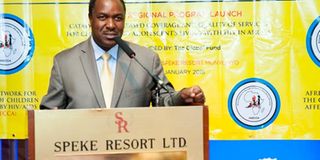Child health body secures shs12.5b global fund for HIV prevention

Dr Elioda Tumwesigye, the Minister of Health was guest of honour at the launch of the regional programme for the prevention of HIV. Courtesy photo.
The African Network for the Care of Children Affected by HIV/Aids (ANECCA) has secured a $3.6m (about Shs 12.5bn) funding from the Global Fund.
The funding will go towards implementation of a regional project that will tackle issues affecting the prevention of HIV spread among children.
With the funding received, the regional programme will follow up the three key areas of policy, human resource and knowledge that were identified as the reason behind the low paediatric and adolescent ART coverage in Africa.
Dr Denis Tindyebwa, the executive director and co-founder of the African Network for the Care of Children Affected by HIV/Aids, said the money from the fund is not going to be shared in the seven member countries identified.
“The money will be spent at regional level studying the policies implemented in those countries. The only expenditure that we shall incur will be through advocacy and stakeholder engagement,” he explained.
The programme launched will be implemented over a three-year period studying policies and synthesising them and going to the countries to talk to the stakeholders.
Hon Elioda Tumwesigye, the Minister of Health, who was guest of honour at the launch of the regional programme, hailed the need to increase awareness of the HIV scourge among children.
The minister said that Uganda today has 1.544 million people living with HIV. He also cited HIV/Aids as the number one cause of death among adolescents in Africa because measures have not been identified to prevent the spread among this group.
“In Uganda, we have 1.544 million people living with HIV, out of that, 1.4m are adults, and 137,356 are children,” he said.
“When you look at the statistics, out of every 10 adults, there is one child living with HIV…when you look at people who are on treatment by September 2015, we had 823,000 people. Out of these 761,000 were adults and 61,279 were children. This means that for every 12 adults, only one child is on ARTs,” he added.
The World Health Organisation guidelines of 2010 stipulate that all children should be put on ARTs irrespective of their CD4 status.
ANECCA will, therefore, look at policies and laws that could facilitate HIV treatment for the children.
The minister further said the programme if successfully executed, will go a long way in implementing the World Health Organisation guidelines among the member countries.
The organisation is a network of clinicians and social scientists committed to promoting ways of improving the quality of clinical and non-clinical care of children affected by HIV/Aids in the Africa region.
ANECCA started in 2001 as a pan African network committed to improving access to quality and comprehensive access to HIV preventive care.
However, a study conducted around the African continent has identified seven countries which are still struggling to scale back the HIV infection.




